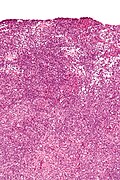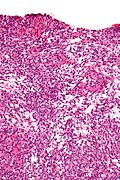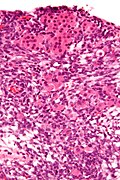Difference between revisions of "Sertoli-Leydig cell tumour"
Jump to navigation
Jump to search
| Line 22: | Line 22: | ||
DDx: | DDx: | ||
*[[Endometrioid carcinoma of the ovary]]. | *[[Endometrioid carcinoma of the ovary]]. | ||
*Luteinized adult granulosa cell tumour - super rare, 50% of cell with eosinophilic cytoplasm, other findings of granulosa cell tumour, e.g. Call-Exner bodies.<ref name=pmid21804396>{{Cite journal | last1 = Ganesan | first1 = R. | last2 = Hirschowitz | first2 = L. | last3 = Baltrušaitytė | first3 = I. | last4 = McCluggage | first4 = WG. | title = Luteinized adult granulosa cell tumor--a series of 9 cases: revisiting a rare variant of adult granulosa cell tumor. | journal = Int J Gynecol Pathol | volume = 30 | issue = 5 | pages = 452-9 | month = Sep | year = 2011 | doi = 10.1097/PGP.0b013e318214b17f | PMID = 21804396 }}</ref> | *Luteinized [[adult granulosa cell tumour]] - super rare, 50% of cell with eosinophilic cytoplasm, other findings of granulosa cell tumour, e.g. Call-Exner bodies.<ref name=pmid21804396>{{Cite journal | last1 = Ganesan | first1 = R. | last2 = Hirschowitz | first2 = L. | last3 = Baltrušaitytė | first3 = I. | last4 = McCluggage | first4 = WG. | title = Luteinized adult granulosa cell tumor--a series of 9 cases: revisiting a rare variant of adult granulosa cell tumor. | journal = Int J Gynecol Pathol | volume = 30 | issue = 5 | pages = 452-9 | month = Sep | year = 2011 | doi = 10.1097/PGP.0b013e318214b17f | PMID = 21804396 }}</ref> | ||
===Images=== | ===Images=== | ||
Revision as of 19:10, 11 January 2015
Sertoli-Leydig cell tumour, also Sertoli-Leydig tumour, is a rare tumour of the gonad in the sex cord stromal group of tumours.
General
- Sertoli and leydig cells are normal in the testis.
- Poorly differentiated tumours have sarcomatous features.[1]
- May present with masculinization (virilization).[2]
Microscopic
Features:
- Sertoli or Leydig cells.[1]
- Leydig cells:
- Abundant solid eosinophilic cytoplasm.
- Round nuclei with fine chromatin and a small or indistinct nucleolus.
- Often in small clusters ~ 5-25 cells/cluster.
- Sertoli cells:
- Pale/clear vacuolated cytoplasm.
- Irregular nuclei with irregular/vacuolated-appearing chromatin.
- Architecture: tubules, cords or sheets.
- Leydig cells:
- Stroma.
- +/- Sarcomatous features (mucinous glands, bone, cartilage).
DDx:
- Endometrioid carcinoma of the ovary.
- Luteinized adult granulosa cell tumour - super rare, 50% of cell with eosinophilic cytoplasm, other findings of granulosa cell tumour, e.g. Call-Exner bodies.[3]
Images
www:
IHC
Features:[4]
- WT-1 +ve.
- Melan A (MART-1) +ve - marks the Leydig component.
- Vimentin +ve.[5]
- Calretinin +ve.
- CD99 +ve.
Others:[5]
- CD34 -ve.
- Cytokeratin -ve (usually).
See also
References
- ↑ 1.0 1.1 Cotran, Ramzi S.; Kumar, Vinay; Fausto, Nelson; Nelso Fausto; Robbins, Stanley L.; Abbas, Abul K. (2005). Robbins and Cotran pathologic basis of disease (7th ed.). St. Louis, Mo: Elsevier Saunders. pp. 1103. ISBN 0-7216-0187-1.
- ↑ Xiao, H.; Li, B.; Zuo, J.; Feng, X.; Li, X.; Zhang, R.; Wu, L. (Mar 2013). "Ovarian Sertoli-Leydig cell tumor: a report of seven cases and a review of the literature.". Gynecol Endocrinol 29 (3): 192-5. doi:10.3109/09513590.2012.738723. PMID 23173550.
- ↑ Ganesan, R.; Hirschowitz, L.; Baltrušaitytė, I.; McCluggage, WG. (Sep 2011). "Luteinized adult granulosa cell tumor--a series of 9 cases: revisiting a rare variant of adult granulosa cell tumor.". Int J Gynecol Pathol 30 (5): 452-9. doi:10.1097/PGP.0b013e318214b17f. PMID 21804396.
- ↑ Zhao, C.; Vinh, TN.; McManus, K.; Dabbs, D.; Barner, R.; Vang, R. (Mar 2009). "Identification of the most sensitive and robust immunohistochemical markers in different categories of ovarian sex cord-stromal tumors.". Am J Surg Pathol 33 (3): 354-66. doi:10.1097/PAS.0b013e318188373d. PMID 19033865.
- ↑ 5.0 5.1 Kondi-Pafiti, A.; Grapsa, D.; Kairi-Vassilatou, E.; Carvounis, E.; Hasiakos, D.; Kontogianni, K.; Fotiou, S. (2010). "Granulosa cell tumors of the ovary: a clinicopathologic and immunohistochemical study of 21 cases.". Eur J Gynaecol Oncol 31 (1): 94-8. PMID 20349790.


